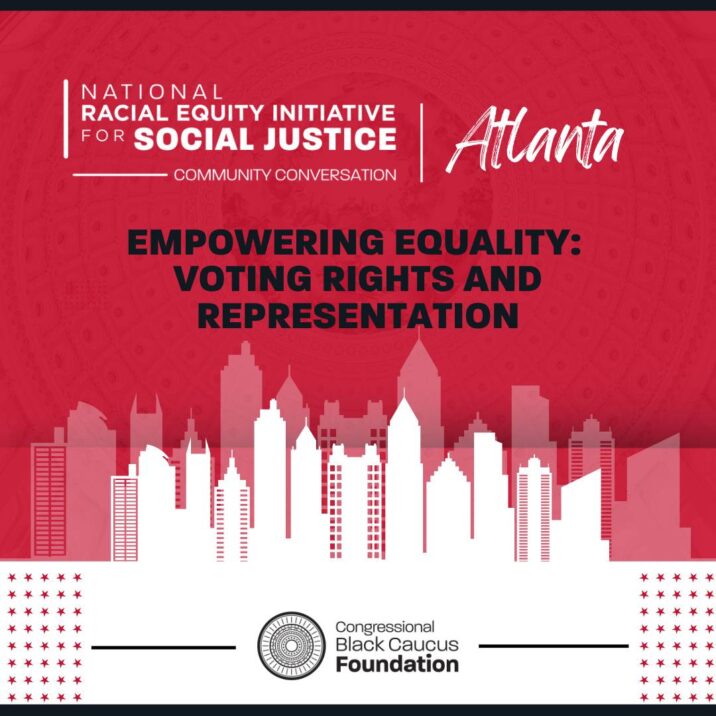Media Contact:
Yolanda Raine
Vice President, Marketing and Communications
media@cbcfinc.org
202-809-2011
ATLANTA – This weekend, the Congressional Black Caucus Foundation (CBCF) National Racial Equity Initiative for Social Justice hosted its Community Conversation to convene legislators, policymakers, activists, and community members to address the critical issues surrounding voting rights and representation in America. Recognizing the pivotal role of voting in democratic governance, the gathering discussed historical and present-day challenges and systemic barriers that have impeded marginalized communities’ access to the ballot box.
“As part of our mission to inform policy and educate the public, we established Community Conversations to tackle systemic racism through strategic partnerships and community dialogues,” said Nicole Austin-Hillery, President and CEO of the CBCF. “Today’s Atlanta Community Conversation explores the ongoing quest for equitable voting rights and representation in America. We always aim to identify actionable solutions that address the historical and contemporary challenges disproportionately affecting marginalized communities.”
“The CBCF is in Georgia to highlight the challenges we face as we move toward the 2024 election,” said Congressman Hank Johnson. “It’s a good time to educate people about the effects of voter suppression in Georgia, and the impact it’s having on our ability to exercise our fundamental right to vote.”
Through the onsite voting and activism fair, attendees engaged with social justice and voting activists, and leaders of community organizations to discover their impactful work, gain insights into pressing issues, and explore ways to join the movement for social justice and voting rights reform. The event also featured in-depth content sessions. Highlights from the sessions included:
Unmasking Voter Suppression: Gerrymandering and the Shadow of Political Violence Against Black Communities
- In southern states like Georgia, gerrymandering and voter suppression significantly undermine Black communities’ political representation and influence, continuing a legacy of political violence and discrimination.
- “Gerrymandering undermines our democracy. It confines our power to specific districts, hindering our ability to gain the necessary support for our communities. We cannot allow elected officials to seek our votes only during election season. We need competitive races to ensure diverse representation that supports our communities’ growth and well-being. By showing up in record numbers, like in 2020 and 2022, we can make a difference and counteract any barriers. Stay engaged, think creatively, and hold our elected officials accountable. Know who’s running, understand their platforms, and demand they deliver on their promises.” – Helen Butler, Executive Director, Georgia Coalition for the Peoples Agenda
- “Voter suppression in the form of gerrymandering is a deliberate attempt to dilute Black political power. It’s part of a broader strategy that includes the shadow of political violence against our communities. We must unmask these tactics and confront them head-on. By staying informed and mobilized, we can safeguard our voting rights and ensure that our voices are heard. Our collective strength lies in our unity and our unwavering commitment to justice and equality.” – Cliff Albright, Executive Director, Black Voters Matter
Unlocking the Ballot Box: Restoring Voting Rights Through Criminal Justice Reform
- As of 2023, only Maine, Vermont, and Washington, D.C., allow individuals with felony convictions to vote, yet by 2024, more than 5.8 million Americans—40% of whom are Black—will be disenfranchised, prompting calls for criminal justice reform and highlighting the role of voting in rehabilitation and community engagement.
- “The 14th Amendment of the Constitution says anyone born in the United States is a citizen, and that all citizens have the right to vote. Being incarcerated does not end your citizenship. Crime is just another way to ‘other’ people and to create division. I encourage everyone to join the fight by exercising your right to vote–in the name of someone else who can’t.” – Kareemah Hanifa, Lead Community Organizer, IMAN Atlanta
- “No one should ever lose their right to vote. As community organizers, we must do more than petition for policy changes; it’s also about care for the community. And we can start by changing the narrative and replacing the term “felons” with people-first language.” – John Paul Taylor, Senior Campaign Strategist-Rights Restoration, Advancement Project
Uncovering Technology’s Impact on Future Elections and Civic Engagement
- Technology and media are powerful forces shaping Black community civic engagement, enabling online activism that translates to real-world action, yet also posing challenges like misinformation, as seen in a 2020 viral video discouraging Black voting; panelists will explore technology’s dual role in influencing elections and civic participation, and strategies to combat disinformation and enhance democratic engagement.
- “The pandemic forced everyone to use social media and internet. Now, the challenge is people who weren’t typically engaged are now receiving information from sources they can’t verify. Now more than ever, the role that community organizations play in protecting against disinformation can’t be understated.” – Jeanine Abrams McLean, President, Fair Count
- “There’s misinformation, disinformation, and malinformation. And we need multiple types of resources to conquer it all. From technology and policy to regulation and trusted messengers in our communities, we must use what’s available to us to fight disinformation. With the proliferation of AI, the role of trusted messengers becomes even more important to combat the spreading of bad information.” – Esosa Osa, Founder and CEO, Onyx Impact
To learn more about the Congressional Black Caucus Foundation, visit cbcfinc.org.
###
About CBCF
Established in 1976, the Congressional Black Caucus Foundation, Inc. (CBCF) is a non-partisan, nonprofit, public policy, research, and educational institute committed to advancing the global Black community by developing leaders, informing policy, and educating the public. For more information, visit cbcfinc.org.
